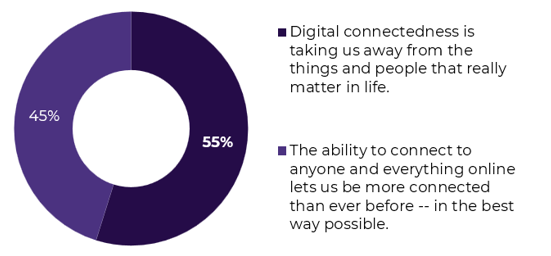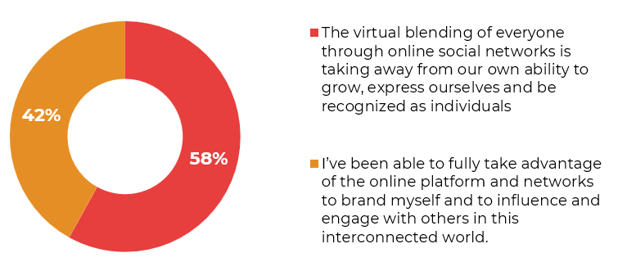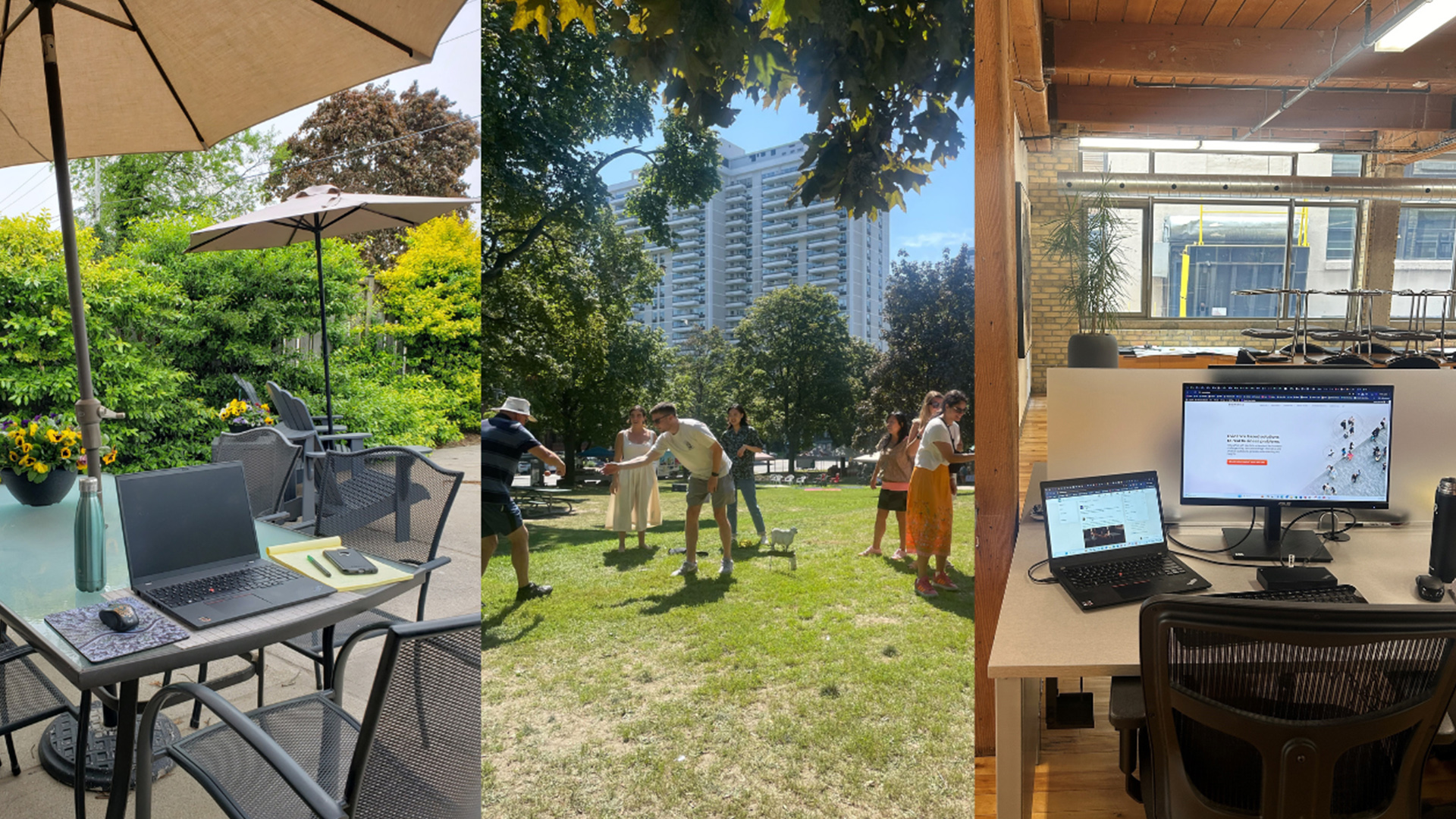Millennials are Conflicted about Technology
ARTICLE BY SARA PLAVSIC AND KAIT MOREAU
Millennials often feel that their generation has been shaped in especially powerful ways by changes in technology. They grew up in a time when transformational technologies – from the rise of the Internet and mobile devices to the mainstreaming of social media – were being developed in rapid succession and having profound effects on individual lives and on society at large. Many Millennials recall a time when they lived without the Internet or a phone. Some look back on this time as simpler, even idyllic, with others embracing all that technology has offered them. How Millennials look back on the time before the Internet tends to be shaped by how they use and view technology today: the amount of time and energy they devote to being connected, how technology affects different aspects of their lives, and how they see technology’s effects on society overall.
These sometimes-conflicting forces are of particular importance to Millennials as they enter the prime family and working years of their lives.
Recently, Environics Research interviewed 37 Millennials from across Canada to gain a better understanding of this cohort’s current mindsets, motivations and needs. This diverse group of Millennials shared their experiences and perspectives on a broad range of topics, including technology – revealing complex and conflicted relationships with their devices and online lives.
A positive take on technology…
In general, Millennials feel positive about technology, seeing it as essential for communication, work, and convenience in today’s world. Millennials describe how deeply ingrained technology is in their lives; from how they connect with friends and family (phone), make a living (laptop), enjoy entertainment (TV & earbuds), stay organized, monitor exercise (smart watch), and keep their homes comfortable and efficient (smart thermostat). One participant in our research shared that they use their phone for 90% of their communication with friends and family – mainly via text messages and group chats – and used their laptop only for work-related tasks. Many Millennials often named their phone as their favourite device. As one participant pointed out, “there is nothing it [their phone] can’t be.”
Perhaps unsurprisingly given their early experiences, Millennials as a cohort have high Adaptability to Complexity (as measured in our Social Values research): the tendency to adapt easily to the uncertainties of modern life, and not to feel threatened by the change and complexity. Instead, they express a desire to explore this complexity as a learning experience and a source of opportunity. Our Social Values research indicates that Millennials, are second only to members of Gen Z in their Enthusiasm for New Technology: a value that expresses a favourable bias toward technology. Fascinated with the possibilities offered by modern technology, they believe that new devices and digital tools are invaluable in navigating today’s world, helping them adapt and respond to the demands of daily life. Millennials who are strong on this construct have great confidence that science and technology can better their lives. Additionally, the streamlining and convenience benefits are especially meaningful to this cohort because of their high scores on Time Stress: the sense of never having enough time in a day to get everything done, and resulting feelings of stress and anxiety.
Overall, advancements in technology have simplified and streamline tasks in many aspects of life that matter deeply to Millennials, including organization, work, planning, and travel. Two other benefits stood out in our interviews: one was the ability to communicate with friends and family far away, the other was the power and convenience of having a supercomputer in the palm of their hands – enabling increased access to information and venues for self-expression, as well as opportunities to foster greater equality and amplify diverse voices in various fields.
…with an awareness of the shadow side of relentless connectivity.
While recognizing the many benefits of technology, Millennials are quick to acknowledge that technology is a double-edged sword. In our interviews, many vacillated between discussing the benefits and the costs. Issues about which they expressed concern included the proliferation of misinformation; privacy concerns; difficulty disconnecting due to the addictive properties of some platforms and activities; related concerns about wasting time; the unbounded potential of AI (including potential harms); the peer pressure of social media; and reduced in-person connections, leading to the erosion of social skills.
Some also observed that there’s no escape from digital devices and connectivity, noting that these are practically indispensable in modern organizations – in businesses, academic institutions, and many civic contexts – making technology an essential part of daily life. Some Millennials also expressed concern that the pervasiveness and power of online discourse have transformed public conversations in general, in some ways for the worse: spreading misinformation and diminishing the influence of true experts, as unqualified individuals pose as authorities on various subjects.
Millennials are ambivalent about the relative merits of real-life experiences and digital connectivity with family and friends, which they also value highly. Overall, they tend to express stronger attraction to live human connections, perhaps seeking respite from the overwhelming presence of technology in their daily lives. Many Millennials spend the majority of their time “online” rather than in-person. Of those surveyed, report that 50 to 90% of their social interactions take place online; this high percentage is explained partly by the heavily online nature of their work, with most of in-person socializing limited to the weekend.


As Millennials enter new stages of their lives (the youngest Millennials are nearly entering their 30s, while the oldest have just entered their 40’s), their reflections on technology are evolving. Millennial parents are reflecting on what their own use of technology communicates to their children. They’re also debating how much screen time their children should have. Those who primarily work at computers express concern about the amount of time they spent sedentary and plugged into the Internet.
To manage these concerns, Millennials describe efforts to maintain a healthy balance of digital and real-life experiences by limiting screen time, prioritizing face-to-face interactions, and creating opportunities for genuine connections. Many Millennials recognize their personal conflict with technology, seeing that it makes their lives easier while exacting significant costs – and there’s no escaping either side of that balance. They also feel that their increasing reliance on technology contributes to a more polarized society and the erosion of community. They see more human interactions as the most promising way to counteract this trend.
In an ever-digitized world, brands and companies need to critically consider the dichotomy of impacts connectivity can have on Millennial consumers especially when it comes to building trust and creating meaningful interactions with them online. As Millennials enter their prime years, they are poised to inherit a position of enormous economic and political power that will have a significant role in shaping the digital future. By participating in these digital spaces, Millennials are increasingly looking to do so transparently, safely, and meaningfully – and brands have a unique opportunity to lead and shape these experiences by meeting, even exceeding their expectations.
Within these broad generational patterns, Environics’ Millennials Social Values segmentation reveals important differences in values and perspectives within this generational cohort. To understand more about Millennials and the role technology plays in their lives as well as other topic areas like lifestyles, social circles, personal outlooks and how they see the meaning of life, download our Millennials Segmentation Report.
Find out how our team can help your organization
Related insights



Toronto
366 Adelaide Street West
Suite 101, Toronto, ON
Canada M5V 1R9
416 920 9010
Ottawa
135 Laurier Ave W.
Ottawa, ON
Canada K1P 5J2
613 230 5089
Calgary
421 7th Ave SW
Suite 3000, Calgary, AB
Canada T2P 4K9
403 613 5735
